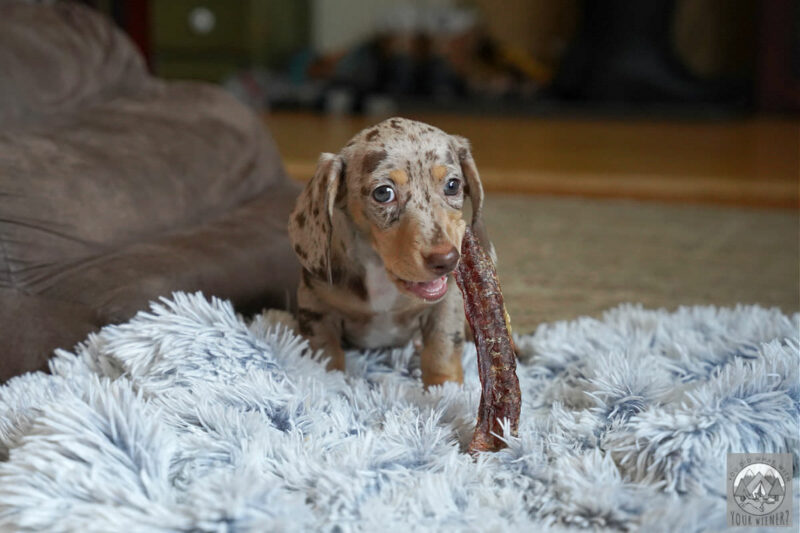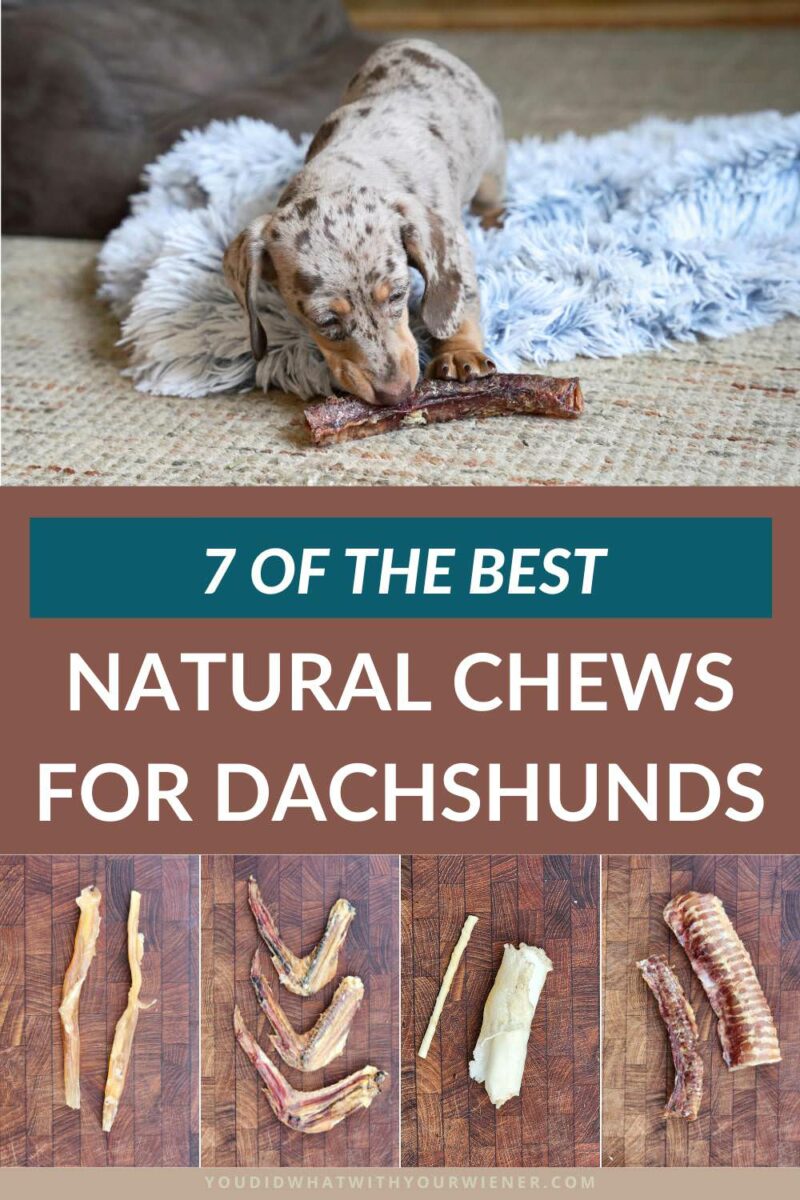7 of the Best Natural Chews for Dachshunds (and Where to Get Them)
I am a huge fan of natural chews for Dachshunds, and I give one to my dogs on a daily basis.
Natural chews are:
- Well, natural, and don’t contain any filler ingredients
- Fully digestible (as long as they are processed naturally)
- High in protein and/or minerals and vitamins
- Made of animal parts of some sort
- Limited ingredient, so they are good for dogs with allergies
I get a lot of questions from followers about them, so I’m providing a list of my top 7 favorites and where to get them.

But, first, why do my dogs get a natural chew once a day and how do I feed it to them (it’s not as simple as you may think)?
Reasons to Give Your Dachshund a Natural Chew
There are several reasons that I make sure that my Dachshunds get a natural chew daily.
I give my dogs natural chews:
- To mechanically scrape tartar off of their teeth (see my no-toothbrush protocol, which includes the use of a plaque softener, for more information about that).
- To occupy them in their crates and to help make positive associations with the crate.
- To keep them busy while offering mental stimulation.
- To help distract them when I leave the house so that they are less anxious about me walking out the door or when guests arrive.
- To naturally promote relaxation and reduce stress
- As a tool to redirect my puppy and reduce biting and chewing on no-no items.
It’s important to note that, depending on the size and texture of the chew, I often don’t give them the chew unsupervised, and I don’t let them eat the whole thing at once.
Always supervise your Dachshund with a chew, especially if it’s one they haven’t eaten before.
How I Feed My Dachshund’s Natural Chews
In most cases, natural chews are tougher than your typical “commercially created” chews for dogs.
But Dachshunds have very strong jaws!
While there are some Doxies that are dainty about eating them, a determined Dachshund can eat through a 6-inch bully stick in 15 minutes or less.
And some can break off large chunks and will try to swallow them.
Also, part of the reason that I like natural chews is that they are tough and last, but that also means that chewing on them too vigorously for too long can cause my dog’s gums to bleed a little.
A little bit of bleeding is nothing to worry about to me, but I want to end the chew session when it starts.
That’s not to mention the calories.
Be sure to account for the calories in the chews that your dog eats in their daily allowance.
I closely monitor how many calories my Dachshunds eat a day, so I rarely want them eating the whole thing in one sitting. Especially because I may want to give them a chew several times a day.
Here are some important notes about how and when I feed natural chews to my dogs:
- Typically, I only let my dogs have a chew for 10-15 minutes at a time, and never wholly unsupervised, at least not with a new chew I haven’t monitored in the past.
- Depending on the chew, and my needs at the time, I may give them this chew in their crate, on their mat (some call it place), or outside in the yard.
- If the chew is not finished, which it typically is not, I take it away from them when the time is up.
- If it is a low-value chew, my dogs will give it back to me when I give them the “that’s enough” command.
- If it’s a very high-value chew, I “trade” them for something delicious like a bit of their raw food or cheese.
- I only give them a chew 1-2 times a day for 10-15 minutes at a time.
- If a significant amount of chew is consumed in a day, I reduce the amount of food that I feed at mealtime to compensate for the extra calories.
- Because these chews are made of or contain meat, I store munched on chews in the freezer until next time.
I don’t give my dogs the same type of chew each time for variety of taste, so they always look forward to them because never know what they might get, and to vary the chew level (hardness).
My Favorite Natural Chews for Dachshunds
Disclosure: Many of the links on this pate are affiliate links (Amazon Associate or other programs we participate in). As an affiliate, I earn a small commission from qualifying purchases.
While I like to introduce some new chews into the rotation occasionally, these are the ones that I return to again and again.
Please note that all of these are sourced and made in the US, or countries with very high food standards like South America (some countries even have higher standards than the US).

1) Bully Sticks
Bully sticks are my favorite go-no natural chew because they are moderately durable and easy to get.
In case you don’t know already, and so you are not shocked later, whether it’s called a bully stick or bull pizzle, it’s an air-dried dried bull penis.
Some can smell really bad, and I typically give this chew indoors, so I always get the “low”, or no, odor versions (sometimes also referred to as odorless).
Also, I throw the ends away once they get small enough for my dogs to try and swallow them. To cut down on waste, I get the thick, 12-inch bully sticks.
When given for 10-15 minutes at a time, one 12-inch bully stick will last for at least 4 or 5 sessions, so they make a great, safe rawhide alternative.
My only “warning” with these is that they can get stringy and stuck in the teeth. I’ve had to pull pieces out of my dog’s teeth on several occasions.
I purchase my bully sticks from my local pet store or online from brands like BarkWorthies or Pawstruck.
Even though they only come in a 6″ length, I also sometimes buy the BarkWorthies Hickory Smoked Bully Sticks because the dogs love them.

2) Fur-On Cow Ears
These are ah-mazing for cleaning my Dachshund’s teeth but whoa do they smell horrid. I mean, they are air dried dead animal parts.
But they are tough and the coarse hair takes the plaque off their teeth easily.
If plaque has accumulated at the gumline, 2 or 3 chew sessions with a furry cow ear will take it almost completely off.
Hair is also a natural “intestine sweeper” and dewormer.
Cow ears are typically very large and thin, although they are thick and meaty at the base, so I feed one ear in 2-3 chew sessions.
I feed these only outdoors due to the stench so, unfortunately, I don’t feed them as often as I would like in winter.
The only drawback to me is that Summit finds these to be very high value so it can be difficult to get back from her.
I have to use a super high value food item to trade, and I have to toss it well away from the ear, so I have time to snatch it from her before she turns around to guard it again.
I buy my cow ears from Naked Beast Snacks. I occasionally buy smaller calf ears from Etsy.

3) Beef Tendons
My Dachshunds really like beef tendon, but it’s softer than the two chews above so more of it is consumed during one chew session.
For that reason, I treat these more as “dog food” that takes longer to eat and has some other benefits.
I use tendons most often with my 10-week-old puppy since his teeth aren’t as strong.
I typically buy them from the local boutique pet store, but sometimes I buy them online.
I buy smaller tendons for my Dachshund puppy and these larger beef tendons for the adult dogs.
The small tendons typically last 4-6 puppy chew sessions and the larger ones last my adult dogs 2-3 sessions.
Because these are softer and more brittle than most chews that we use, I allow my Dachshunds to chew up and swallow the end pieces (unlike with the bully sticks).
These don’t smell and are not messy, so I feed these indoors.

4) Duck (or Chicken) Wings
Contrary to popular belief, dogs can eat and digest bone (although, only feed bone to your dog if you are comfortable with it) if the bone is raw.
IMPORTANT: NEVER FEED COOKED BONES TO YOUR DOG
Dried duck or chicken wings can make a great chew because they contain softer, hollow bone with some cartilage, meat, and connective tissue.
The bone and cartilage are tougher and are what make this a “chew”, although it’s more on the brittle spectrum and is often consumed faster than the other chews on this list.
I let the dogs eat a single wing in one session. They are a little bigger than I would like them to eat all at once but too small for me to divide into two sessions.
Like the tendons above, they don’t really smell, and I use them as more of a “chew food” to eat indoors.
I typically feed air dried versions of poultry wings that come in my Real Dog Box subscription or that I order from Naked Beast Snacks.
I may try raw chicken wings from the grocery store sometime though.
Note: other raw meaty bones include chicken feet, heads, and necks. I’ve fed raw feet before, and air-dried chicken and duck heads, and dried necks, but Gretel tries to swallow raw necks whole without chewing, so I don’t feed the dogs those.
5) Beef Collagen Sticks
Collagen sticks are similar in form and function to bully sticks, but they’re a little cheaper and don’t have the same “icky body part” factor (they’re made from the skin vs a penis).
My dogs don’t like them as much as the bully sticks, but they don’t turn their nose up at them either.
They are about as tough and long lasting as bully sticks, and are not stringy, so pieces are less likely to get stuck in my dog’s teeth.
In my opinion, they don’t smell so I feed them indoors.
I order collagen sticks from Pawstruck.

6) Trachea Chews
The most common trachea (windpipe) chews are made from cows, but you can find them sourced from goat, lamb, or other animals too.
Trachea is almost completely made of cartilage which, besides the general benefits of a natural chew listed above, provide naturally occurring chondroitin and glucosamine, which are great for your dog’s joints!
Although these chews are on the softer side, the unusual shape makes them challenging for a dog to eat quickly.
They can be purchased as rings that can be eaten in one session or longer lengths that can be consumed over several.
I feed trachea chews when they arrive in our Real Dog Box subscription box, buy the Barkworthies Hickory Smoked Beef Trachea, or purchase Nature Gnaws USA Smoked Bison Trachea Rings online.

7) Earth Animal No-Hide Chews
These are the only chews on this list that are not single ingredient. However, the list is short.
I would never, ever give my dog rawhide because it’s not digestible and is treated with chemicals to turn it white, but these chews are similar in look and texture while being healthy.
No-hide chews are made of the protein, or “flavor” (chicken, beef, salmon, peanut butter, etc), plus brown rice flour, agar-agar, organic eggs, olive oil, banana powder, and pineapple stem.
There is very little odor, and you can choose small sticks to be eaten in one session or a larger roll which can be consumed over several.
Final Thoughts
I think natural chews are an important part of a Dachshund’s diet.
They can add variety and interest to what your dog eats in a day and help with important things like cleaning teeth, providing mental enrichment, and reducing stress.
You’ll notice that I didn’t include antlers or yak cheese chews on my list, which are commonly recommended natural chews for dogs.
That’s because they are very hard.
I’ve heard of antlers splintering and getting stuck in a dog’s gums and both chews cracking teeth.
While some chews on this list are harder than others, and it’s possible for a dog to damage their teeth chewing on anything, I am comfortable that the chews listed are unlikely to break teeth.
Always supervise your dog when they’re eating a chew, at least a few times until you are comfortable with how, and how fast, they eat it to help ensure their safety.
Also, if you are new to feeding your dog natural chews like duck wings and cow ears, beware that they are rich and can take some adjustment.
Start out by feeding a little at a time and monitor your dog after to make sure it doesn’t upset their tummy.


About the Author
Hi, I’m Jessica. I’ve been studying the Dachshund breed since 2007, owned 3 of my own, and shared in the lives of thousands of others through their owner’s stories. When I’m not sharing what I know on this blog, you can find me hiking, camping, and traveling with my adventurous wiener dogs.
